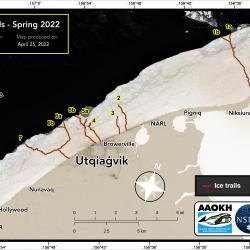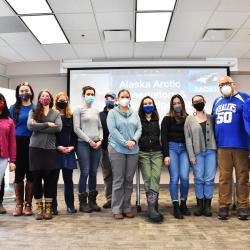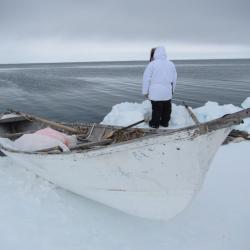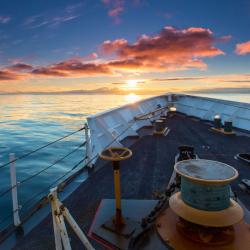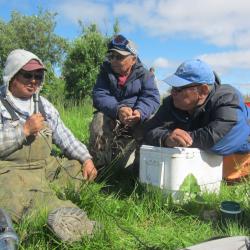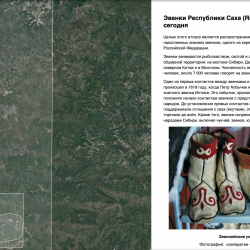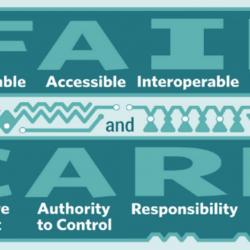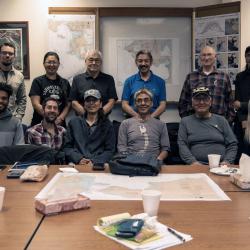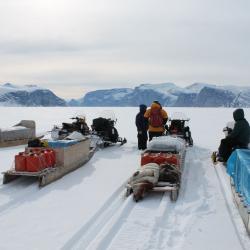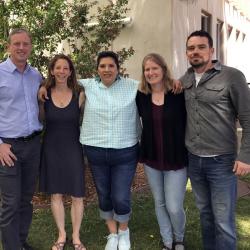AAOKH and ELOKA partner for ice trail mapping in Utqiaġvik, Alaska
Matt Druckenmiller and Josh Jones from Alaska Arctic Observatory & Knowledge Hub (AAOKH), traveled to Utqiaġvik, Alaska, to map and survey ice conditions on trails used by local whaling crews.
Read More
Matt Druckenmiller and Josh Jones from Alaska Arctic Observatory & Knowledge Hub (AAOKH), traveled to Utqiaġvik, Alaska, to map and survey ice conditions on trails used by local whaling crews.
Read More
ELOKA members join AAOKH annual meeting
Noor Johnson and Matt Druckenmiller from the ELOKA met with community observers, advisors, and staff from the AAOKH at their annual meeting.
Read More
Noor Johnson and Matt Druckenmiller from the ELOKA met with community observers, advisors, and staff from the AAOKH at their annual meeting.
Read More
NSF renews funding for 15-year NSIDC program to support Arctic community-led research and Indigenous Knowledge sovereignty
The National Science Foundation (NSF) has renewed funding for the program with a five-year collaborative award to ELOKA, Calista Education and Culture (CEC), the Alaska Arctic Observatory and Knowledge Hub (AAOKH) at the University of Alaska Fairbanks and the Yukon River Inter-Tribal Watershed Council to continue their work with Indigenous partners.
Read More
The National Science Foundation (NSF) has renewed funding for the program with a five-year collaborative award to ELOKA, Calista Education and Culture (CEC), the Alaska Arctic Observatory and Knowledge Hub (AAOKH) at the University of Alaska Fairbanks and the Yukon River Inter-Tribal Watershed Council to continue their work with Indigenous partners.
Read More
Indigenous Advisors Join ELOKA
The Exchange for Local Knowledge and Observations in the Arctic (ELOKA) has formed an Advisory Committee, consisting of four members who will advise ELOKA during its five-year grant period that began in 2021.
Read More
The Exchange for Local Knowledge and Observations in the Arctic (ELOKA) has formed an Advisory Committee, consisting of four members who will advise ELOKA during its five-year grant period that began in 2021.
Read More
The names they carry: The continued efforts of Yupik elders to pass down knowledge
When Yup’ik people from southwest Alaska travel on their ancestral lands and waters, they navigate using traditional place names. These geographical locations of camps or settlements, rivers, ponds, sloughs, even rocks and sandbars convey historical tales about ancestors or battles, or knowledge of harvesting areas and sacred places. Names such as Niugtayagaq, meaning small place of rustling…
Read More
When Yup’ik people from southwest Alaska travel on their ancestral lands and waters, they navigate using traditional place names. These geographical locations of camps or settlements, rivers, ponds, sloughs, even rocks and sandbars convey historical tales about ancestors or battles, or knowledge of harvesting areas and sacred places. Names such as Niugtayagaq, meaning small place of rustling…
Read More
Found in translation
As part of the ELOKA mission of ensuring data sovereignty for Arctic residents, ELOKA helped create online atlases for two groups of Indigenous people: the Yup’ik in Alaska and the Evenki in Siberia, Russia. These atlases use an interactive platform to upload, document, and share the knowledge, places names, and culture of these communities. Recently these atlases have been translated from…
Read More
As part of the ELOKA mission of ensuring data sovereignty for Arctic residents, ELOKA helped create online atlases for two groups of Indigenous people: the Yup’ik in Alaska and the Evenki in Siberia, Russia. These atlases use an interactive platform to upload, document, and share the knowledge, places names, and culture of these communities. Recently these atlases have been translated from…
Read More
Advancing Indigenous data sovereignty
In September 2019, three international efforts were launched to advance Indigenous Peoples’ rights and interests in their data: The Oñati Indigenous Data Sovereignty Communique, the Establishment of the Global Indigenous Data Alliance (GIDA), and the CARE Principles of Indigenous Data Governance. Building on the rights frameworks recognized in the UN Declaration on Indigenous Peoples, these…
Read More
In September 2019, three international efforts were launched to advance Indigenous Peoples’ rights and interests in their data: The Oñati Indigenous Data Sovereignty Communique, the Establishment of the Global Indigenous Data Alliance (GIDA), and the CARE Principles of Indigenous Data Governance. Building on the rights frameworks recognized in the UN Declaration on Indigenous Peoples, these…
Read More
Bering witness: Alaskan Elders give voice to the NOAA Arctic Report Card
Thousands of short-tailed shearwaters, Australian migratory birds, washed up dead on the beaches off of Bristol Bay, Alaska, in late June 2019. By mid-August, the bird die-off stretched north to the Bering and Chukchi Seas.
Read More
Thousands of short-tailed shearwaters, Australian migratory birds, washed up dead on the beaches off of Bristol Bay, Alaska, in late June 2019. By mid-August, the bird die-off stretched north to the Bering and Chukchi Seas.
Read More
Those who work with weather: Inuit and visiting scientists collaborate for better weather information
Long before the introduction of weather service forecasts, Inuit read the Arctic sky and environment to predict the weather.
Read More
Long before the introduction of weather service forecasts, Inuit read the Arctic sky and environment to predict the weather.
Read More
Changes for ELOKA team members: McCann, McNeave, and Pulsifer
The ELOKA team stands together for a group photo in May 2019. Left to right: Peter Pulsifer, Betsy Sheffield, Heidi McCann, Noor Johnson, and Matt Druckenmiller. Not pictured: Chris McNeave, Hannah Wilcox, Julia Collins, Agnieszka Gautier, Brendan Billingsley, and Shari Fox
Read More
The ELOKA team stands together for a group photo in May 2019. Left to right: Peter Pulsifer, Betsy Sheffield, Heidi McCann, Noor Johnson, and Matt Druckenmiller. Not pictured: Chris McNeave, Hannah Wilcox, Julia Collins, Agnieszka Gautier, Brendan Billingsley, and Shari Fox
Read More


